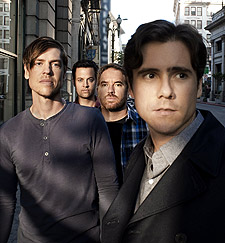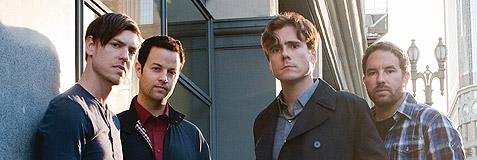
Interview Date: 09/22/2010
Run Date: 09/27/2010
Interviews Home / Music Home / Bullz-Eye Home
Jimmy Eat World are rock-n-roll survivors. Like Wilco once did, the Arizona combo released a couple of commercial disappointments, before being dropped by their major label backers (Capitol). After picking up day jobs and self-funding their next studio album, all of a sudden, the band was in the middle of a record label bidding war. The folks at DreamWorks won out and released the band’s landmark 2001 album, Bleed American. The songs “The Middle” and “Sweetness” were all over modern rock radio and the mainstream success that had previously eluded them finally came to fruition.
The melodic rockers followed up Bleed American with 2004’s far darker Futures album. The Gil Norton-produced effort didn’t match its predecessor’s platinum success, but it still went on to pass Gold certification. 2007’s Chase This Light found Jimmy Eat World choosing to self-produce the sessions along with Butch Vig overseeing the entire album. While poppy lead single “Big Casino” struck a chord with the group’s longtime fans, Chase This Light ultimately didn’t deliver the kinds of numbers the album truly deserved. This week the band is releasing Invented, their seventh studio album, and this time out, they’ve reunited with producer Mark Trombino. The Los Angeles based studio wiz helmed the aforementioned Bleed American, and 1999’s Clarity, arguably the album most popular with die hard fans. On the eve of Invented’s release, Bullz-Eye caught up with singer-guitarist Jim Adkins and talked about the album and their take on the immigration debate going on in their home state of Arizona.Bullz-Eye: Hey Jim, how are you?
Jim Adkins: I’m doing great! Thank you.
BE: One of the first things I wanted to talk to you about was the political situation in Arizona. Have you found yourself getting into a defensive position trying to explain the band’s decision to not partake in the boycott?
JA: Not really, no. I just have to say right off the bat that we don’t support the 1070 bill. We got involved with a coalition here in Arizona called Artists For Action alongside bands like Calexico. We wanted to raise more awareness within the music community, and while I understand why a lot of bands boycotted playing our state, we felt like our efforts were more effective in an internal effort.
BE: Are you the kind of writer that gets inspired by that kind of social and political tension, or does it have the opposite effect on you?
JA: That’s a good question. (Pause) I think it has both effects on me. A lot of the stuff I wrote on the Futures album was directly inspired by the George Bush era. It’s an album definitely of its time. It was me reacting to the political climate of that period. But all this turmoil can be draining. It’s just so disheartening that common decency has had so little to do with the political decisions being made as of late.
BE: I think that’s a good way to put it.
JA: Yeah, it seems so simple. Yet here we are having these discussions.
BE: At this point in the band’s career, how much of your material is written together in a jam room?
JA: It changes all the time. There isn’t a formula for the way we put our material together. The writing and recording aspect of Jimmy Eat World has changed so much throughout the years. A lot of the vocals you hear on Invented are first takes. We don’t really demo anymore.
BE: Though you’ve always colored your material with subtle textural nuances and even orchestration – the single thing that always stands out for me are the vocal melodies. Do they usually come to you before the riffs are even written? I wouldn’t be surprised if they did.
 JA: They sort of happen at the same time. Look, it’s hard for me to get excited about a musical part without having a vocal hook and melody on top of it. I can’t sit there and just ride a G chord till we come up with the next part. I need a vocal melody to drive me.
JA: They sort of happen at the same time. Look, it’s hard for me to get excited about a musical part without having a vocal hook and melody on top of it. I can’t sit there and just ride a G chord till we come up with the next part. I need a vocal melody to drive me.
BE: Do you usually just hum your vocal melody idea into the microphone and then come up with lyrics after the fact?
JA: Yes, I just try and figure out the right phrasing and melody first. I record a scat vocal to follow and then write the lyrics from that. It’s the only way for me to get really excited about the entire process.
BE: The last couple of Jimmy Eat World albums were kicked off with up-tempo tracks like “Big Casino” and “Futures,” but Invented opens with “Heart Is Hard to Find” which is a slower, acoustic track. Was it a conscious move to start the album off in a quieter way?
JA: I think song sequencing on an album isn’t as important as it used to be. People listen to individual tracks these days. It used to be that you would sequence the songs for an entire listening experience.
BE: It’s too bad that’s changed. I guess the same could be said about the old days where you would even think about the Side A and Side B thing. It mattered how an artist laid out a record.
JA: Oh, definitely! People are so much more casual about the whole thing now. They are almost passive about it. We liked having “Heart Is Hard to Find” as the opener, but that was just for us.
BE: You have a line in that song that talks about “I can’t compete with the new found religion / The good word seems everywhere.” I couldn’t figure out where you were going with that idea.
JA: The character in that song is someone that is lost in their life. They’re at an emotional bottom. They’re looking at their life, and assessing where they are. It’s something a lot of people our age can probably relate to.
BE: “Evidence” has some striking imagery in it. Can you tell us the back story behind that song?
JA: It’s one of those things where you can take what you want from it. But that was written from the perspective of someone who is living with a person that they just broke up with. It’s such an awkward situation for both parties. On one hand, you have this shared experience, but it feels so strange to be around each other now. You walk around the rooms and see things staring at you that remind you of the relationship.
BE: There is a line that goes, “I watched you put on a dress I’ve never seen.” That’s some brutal stuff.
JA: Isn’t it?
BE: A lot has been made about the band going back to work with Mark Trombino. Did you guys talk about the two albums you made without him?
JA: Not really, but he probably thinks that he could have done a better job on them.
BE: That’s natural for him to think. You expect that.
JA: Of course! But we look at songs like they are each their own complete universe. They are their own new world. We work each song until we see all of the possibilities. We don’t think about our previous work when we’re working on a new track. Mark understands that.

BE: Jimmy Eat World is one of the bands that have cleverly used social media sites to interact with its fans. That said, do you think that applications like Twitter have taken away some of the mystique musical artists have traditionally had in the past?
JA: I think it depends on how you use it and what kind of band you are. We approach it like fans. We do what we would want the bands we like to be doing. Besides, we’re pretty boring. We’re not a mysterious band. It might be different if you’re one of the kinds of artists. We are our own fan base. We’re not trading any secrets away here. We’ve always printed our lyrics. We’ve usually had some kind of band photo in our album inserts. What you see is what you get.
BE: I know you have to go, but I’ve always wanted to ask you about a line in “Big Casino.” What do you mean when you sing, “I’m a New Jersey success story?” Since you guys are from Arizona, I never got the reference.
JA: (Laughs) Right… I understand. That song was about someone who happened to be from New Jersey that for whatever reason, felt that they never got their shot in life. I used New Jersey because no one celebrates their hometown heroes like they do.
BE: That’s so true. You could see it happening with the Gaslight Anthem these days.
JA: Yep. It goes back to Bruce Springsteen and Bon Jovi too. They really rally behind their musical heroes over there. So I thought it was the perfect thing for “Big Casino.”
BE: That’s brilliant. Even though I didn’t know where you were coming from on that song, it didn’t take away from the impact. But knowing this fact now makes it even better. Thanks for doing the interview tonight.
JA: I’m glad I could clear that up. (Laughs) Thank you, too.
You can follow us on Twitter and Facebook for content updates. Also, sign up for our email list for weekly updates and check us out on Google+ as well.












